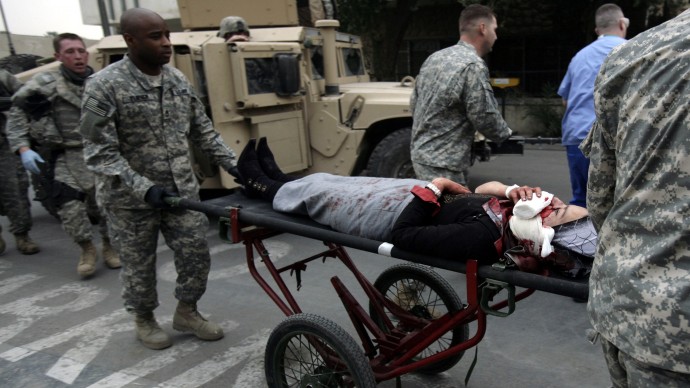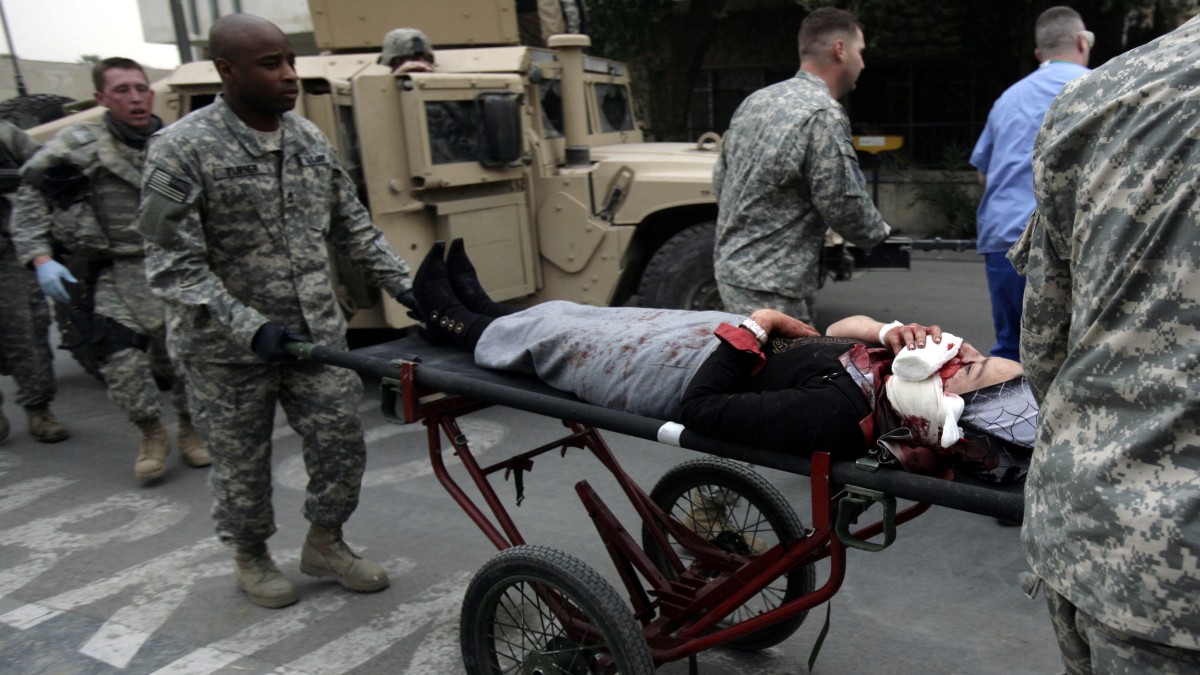
(MintPress) – Before Julian Assange leaked a video that showed United States Apache helicopters shooting on Iraqi civilians, children and journalists, half of Americans thought the way in Iraq was going well, according to a 2010 Gallup poll.
A similar poll taken in late 2011 after the release of the video, had a different tone, with 75 percent of Americans approving of the withdrawal of American troops from Iraq. As torture and prisoner abuse in Iraq’s Abu Ghraib prison ushered in backlash from war opponents between 2004 and 2006, the 2007 helicopter assault would not only change the perspectives of war upon its release on April 5, 2010, but would also change the life of Bradley Manning and bring to the forefront a rash of abuses in the Middle East by US troops.
Assange posted the video he and his Wikileaks staff dubbed “Collateral Murder,” which has acquired more than 12.5 million views on YouTube. The raw video displays a calculated attack by US troops on Iraqi civilians with audio catching conversation such as “Light ‘em all up” and “Come on, fire!”
After release of the classified footage, critics prodded at the video for taking the attack out of context and editing footage. Stephen Colbert seriously tackled the issue during an interview with Assange a week after the video was leaked, saying, “You have edited this tape, and you have given it a title called ‘Collateral Murder.’ That’s not leaking, that’s a pure editorial.”
Assange did not deny the claim, but said the actions in the video were real. A US defense official also has confirmed the authenticity of the video. Assange responded to Colbert’s claim by saying WikiLeaks is an advocacy group that has the benefit of securing classified information. With that information, the group tries to “get the maximum possible political impact for the material they give us.”
“We have a mission to promote political reforms by releasing suppressed information,” Assange has been quoted as saying.
The video has meant many things to different people. Critics see it as a propaganda tool; a veteran used it as motivation to leave Iraq; the man responsible for leaking the video to WikiLeaks faces life in prison; and the US military has been under a microscope, having its recent actions make “Collateral Murder” seem like an afterthought.
Impact on a veteran
While the footage did not influence any policy changes on behalf of the US, it nested in the mind of one Iraq war veteran. In an interview with The Atlantic, Army Specialist Jerry Bordeleau, then 24, said he served two tours in Iraq before leaving the military to join the Occupy movement. Bordeleau says he battles Post-Traumatic Stress Disorder (PTSD) and self-medicates with marijuana. He said he joined the Occupy movement because of WikiLeaks and the “Collateral Murder” video.
Prior to the video, Bordeleau interrogated Iraqis and admitted to using psychological torture. The video, he said, allowed him to see the Iraqis as people for the first time, and not enemies depicted in a video game. Now, as a member of Iraq Veterans Against the War (IVAW), Bordeleau said he feels at home with Occupy and fighting for a mission with people he sympathizes with.
“We’re an industrialized nation who’s a third world country. The super wealthy elite pretty much control our democratic process and everyone here is pretty much fighting for scraps and that’s not right,” Bordleleau said. “If this movement doesn’t work, our country is not going to make it …”
Impact on Bradley Manning
In the span of two years, Manning went from Army intelligence analyst, to an alleged whistleblowing informant for Assange’s Wikileaks team, to a man the United Nations (UN) says has been tortured and treated inhumanly while being held for his 22 charges, which include aiding the enemy. Manning is also alleged to have leaked over 91,000 classified war documents depicting a grim picture of military efforts in Afghanistan.
Much like the “Collateral Murder” video he is alleged of supplying Assange with, Manning has polarized political rhetoric as either a whistleblowing hero or a war criminal. The Movement of Icelandic Parliament has nominated Manning for a 2012 Nobel Peace Prize, and Manning recently won a People’s Choice Award during the 10th Annual Human Rights Awards online voting.
A letter sent to the Nobel Peace Prize committee praised Manning for exploiting US wartime infractions and creating discourse around the globe about America’s involvement in Iraq.
“The revelations – including video documentation of an incident in which American soldiers gunned down Reuters journalists in Iraq – have helped to fuel a worldwide discussion about America’s overseas engagements, civilian casualties of war, imperialistic manipulations, and rules of engagement,” the letter stated. “Citizens worldwide owe a great debt to the WikiLeaks whistleblower for shedding light on these issues, and so I urge the Committee to award this prestigious prize to accused whistleblower Bradley Manning.”
But the charges against Manning are serious, and he faces the possibility of life in prison based on his aiding the enemy charges alone. The US sees Manning’s actions as direct treason, and his treatment has raised questions of whether it is just and necessary.
Two years after Manning’s arrest, he’s still months away from trial. Between those two years, Manning spent 11 months in solitary confinement and was subjected to treatment that the UN’s top torture official, Juan Mendez, called “cruel and inhumane.” Manning was also subjected to daily disrobing and was ordered to be in plain sight of a guard at all times.
“The Special Rapporteur concludes that imposing seriously punitive conditions of detention on someone who has not been found guilty of any crime is a violation of his right to physical and psychological integrity as well as of his presumption of innocence,” Mendez wrote in his report.
Amnesty International, a human rights group, said the US is already acting as though Manning is guilty of crimes of which he has yet to face trial over. The organization said the treatment could be damaging to Manning for when he ultimately faces a judge.
“The harsh conditions imposed on PFC Manning also undermine the principle of the presumption of innocence, which should be taken into account in the treatment of any person under arrest or awaiting trial,” Amnesty wrote in a letter to then-Defense Secretary Robert Gates. “We are concerned that the effects of isolation and prolonged cellular confinement – which evidence suggests can cause psychological impairment, including depression, anxiety and loss of concentration – may, further, undermine his ability to assist in his defense and thus his right to a fair trial.”
Impact on military scrutiny
Since the release of the leaked video, the US has found itself in a human rights and public relations nightmare with the actions of select military members serving in both Iraq and Afghanistan. Most recently, Sgt. Robert Bales was charged with 17 counts of murder after a shooting incident in mid-March that targeted Afghan civilians in their homes. It was reported that Bales broke into the homes and where he began shooting, and then set some of the bodies on fire.
A few weeks prior to the Bales incident, US military personnel burned religious materials, including copies of the Quran in Afghanistan. The incident caused an eruption of protests near the Bargram air base where the books were burned. Demonstrators chanted “long live Islam” and “death to America!” while calling for those involved in the burning to be punished. The US said the burning was unintentional and was accidentally included in a library raid that was conducted in search of writings in books that US officials believed to contain extremist messages.
Before those two events, outrage spread over a captured video that showed American soldiers urinating on the bodies of dead Afghans. Defense Secretary Leon Panetta said the action was outside the characterization of the US military and its standards.
‘We condemn this apparent desecration of the dead as a violation of our nation’s military regulations and of international laws of war prohibiting such disgusting and immoral actions,” Panetta said.
The exposed actions have created hostility and turmoil among the citizens of Afghanistan, as many have echoed similar sentiments of wanting the US military to leave and end its over decade-long occupation of the country.
“They’ve committed a crime. We don’t want them in our country. We don’t like foreigners in our country and they have to leave,” said Kabul citizen, Sayed Abdul Samad.
Like “Collateral Murder,” these actions have raised the issue of what really happens in Iraq and Afghanistan when instances like the aforementioned read the hands of the media. Peace activist Kathy Kelly told Democracy Now! that while officials say these events are outside the norm of military procedure, we have to question the frequency of their occurrence and how many are not being reported.
“President Obama and US military brass are depicting a US soldier killing 16 Afghan civilians as an exceptional event. But in fact, this tragedy reflects and encapsulates the US war of choice in Afghanistan,” Kelly said. “Groups of US soldiers have been breaking into Afghan homes and killing people, without cause or provocation, for the last 11 years. Civilians have been afflicted by aerial bombing by helicopter gunships, drone surveillance and attacks, and night raids.”


